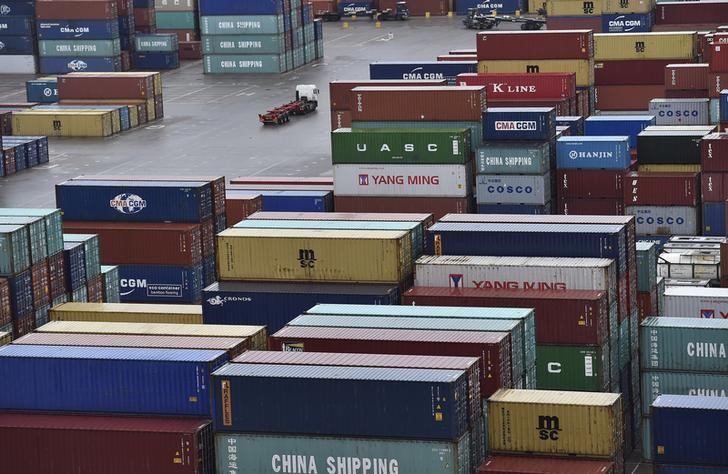By Ana Nicolaci da Costa and Andy Bruce
LONDON (Reuters) - Britain's trade deficit with the rest of the world narrowed markedly in the second quarter and looks set to boost economic growth, although analysts warned that the improvement may not last.
Official figures on Friday showed the biggest surge in goods export volumes in more than nine years in the three months to the end of June, while Britain's total goods and services deficit fell to its lowest level in four years.
Trade has largely dragged on Britain's economic recovery, which has been heavily reliant on domestic demand.
But the Office for National Statistics said the figures indicated that trade likely added to growth in the second quarter, which according to an early estimate stood at 0.7 percent.
The total trade deficit in the second quarter fell to 4.812 billion pounds from 7.496 billion pounds -- the smallest since the second quarter of 2011.
Economists were sceptical about whether the improvement would last long given the strength of sterling, which hit a 7-1/2-year high on a trade-weighted basis earlier this week.
"Even if the (second quarter) strength is not subsequently revised down, it is difficult to envisage the firmer data persisting, given the ferocity of the headwinds coming from the strong pound," said Martin Beck, senior economic adviser to forecasting group EY Item Club.
The Bank of England said on Thursday sterling's strength meant inflation would only pick up slowly, pointing to a possible rise in interest rates early next year.
The goods trade deficit narrowed to 27.440 billion pounds in the second quarter from 30.419 billion pounds in the first quarter, marking the smallest goods trade deficit since the second quarter of 2013.
And goods export volumes surged 6.6 percent on the quarter after barely rising in the first quarter, driven by exports to non-European Union countries -- particularly semi-manufactured goods and fuels. That was the biggest quarterly jump since early 2006.
The sudden improvement looked at odds with closely watched business surveys.
"Faced with disappointingly weak global economic growth and a rapid appreciation of its currency, the UK would expect to see exporters under pressure rather than enjoying surging growth, meaning it's wise to take the official data with a pinch of salt," said Chris Williamson, chief economist at data company Markit.
The Markit/CIPS manufacturing survey published last week showed new export orders contracted for the fourth consecutive month in July.
In June alone, the goods trade deficit in goods widened to 9.184 billion pounds from 8.419 billion pounds, smaller than the 9.3 billion pounds forecast in a Reuters poll.

($1 = 0.6445 pounds)